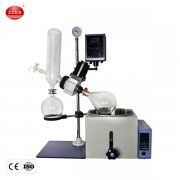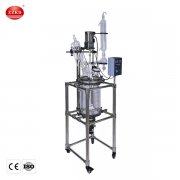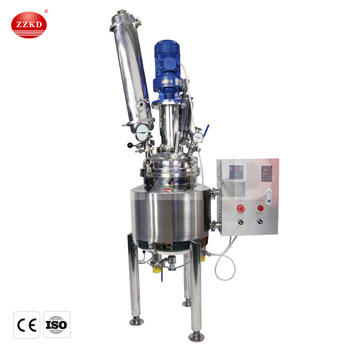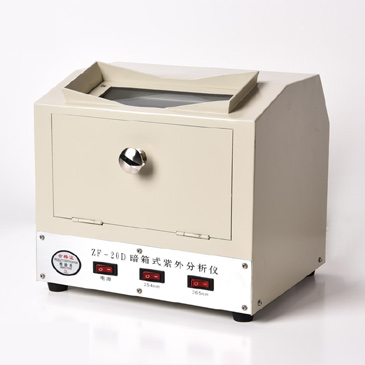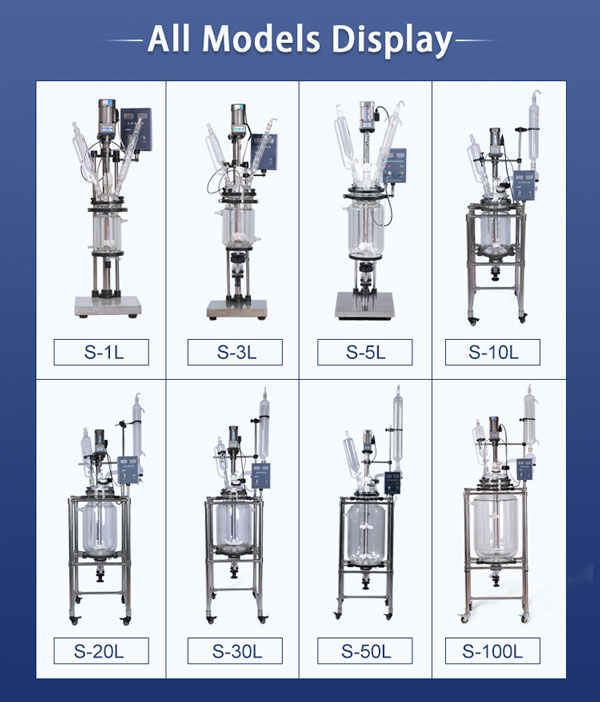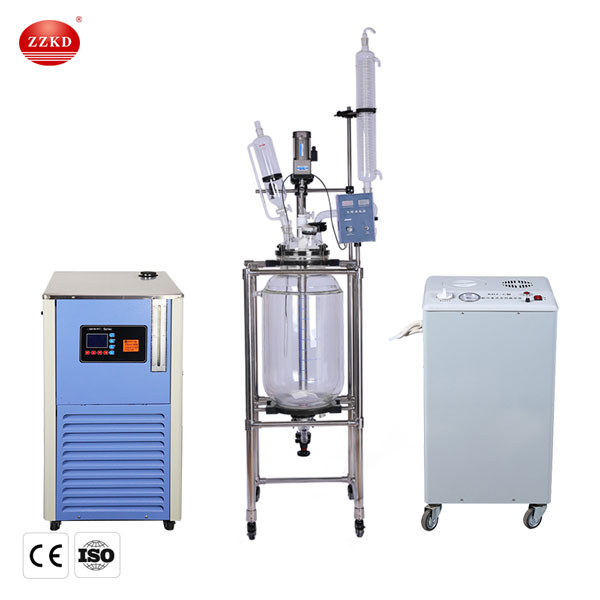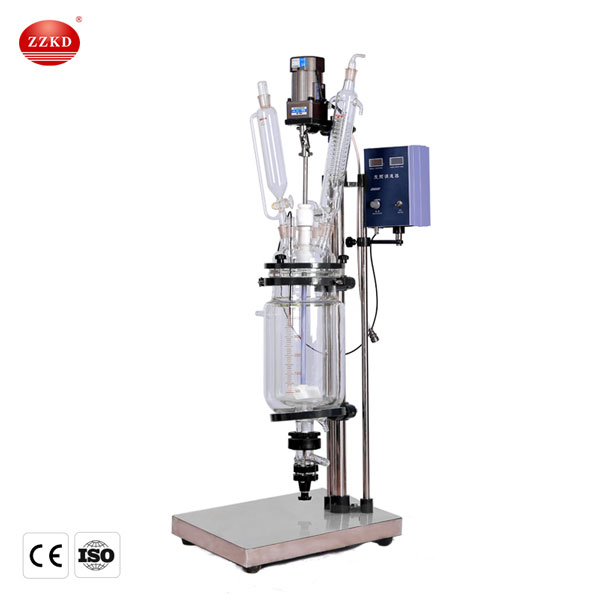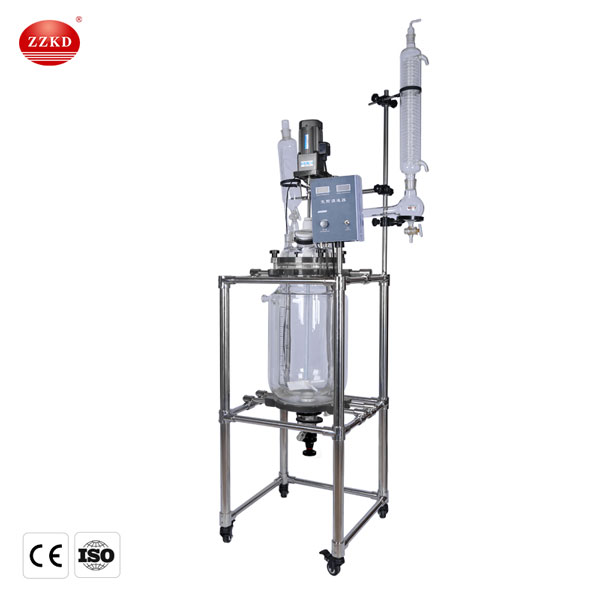Glass filter reactors are cylindrical vessels that are made of borosilicate glass and are equipped with a glass filter that is located at the bottom of the reactor. The glass filter is used to retain solid particles and catalysts while allowing the liquid and gas phases to flow freely through the filter. The
Double Wall Glass Reactor is used to carry out chemical reactions under controlled conditions of temperature, pressure, and agitation.
Design and Components of glass filter reactor:
The design of glass filter reactors varies depending on the requirements of the application. Glass filter reactors come in different sizes, ranging from small laboratory-scale reactors to large-scale industrial reactors. The standard sizes of glass filter reactors are 1 L, 2 L, 5 L, 10 L, 20 L, 50 L, 100 L. The design of the reactor is such that the bottom of the vessel is rounded to ensure efficient mixing and uniform heating. The glass filter at the bottom of the reactor is made of sintered glass or fritted glass and is attached to a PTFE (polytetrafluoroethylene) ring to provide a leak-proof seal.
The glass filter reactor consists of various components, including a heating mantle or jacket, a stirrer, a temperature sensor, a pressure gauge, a reflux condenser, and a sampling port.
➪Glass vessel:
The glass vessel is the main component of the glass reactor. It is made of borosilicate glass and is used to contain the reaction mixture.
➪Jacket:
The jacket is a second glass layer that surrounds the glass vessel. It is used to provide temperature control during the reaction.
➪Agitator:
The agitator is a mechanical device used to stir the reaction mixture. It is typically made of stainless steel and is driven by an electric motor.
➪Condenser:
The condenser is a device used to condense the vapors that are generated during the reaction. It is typically located on the top of the glass vessel.
➪Thermowell:
The thermowell is a device used to measure the temperature of the reaction mixture. It is typically located near the bottom of the glass vessel.
➪Heating and cooling system:
The heating and cooling system is used to control the temperature of the reaction. It typically consists of a heating mantle and a cooling jacket.
➪Pressure sensor:
The pressure sensor is a device used to measure the pressure inside the glass vessel. It is typically located near the top of the glass vessel.
➪Sampling port:
The sampling port is a small opening in the glass vessel that allows a sample of the reaction mixture to be taken without opening the entire reactor.
Applications of glass filter reactor:
Glass filter reactors are used in various applications, including organic synthesis, polymerization, hydrolysis, oxidation, and reduction reactions. Glass filter reactors are particularly useful for carrying out reactions that involve solid catalysts, such as hydrogenation and dehydrogenation reactions. The glass filter at the bottom of the reactor allows the catalyst to be retained while the reaction mixture flows through it. This ensures that the reaction is carried out efficiently and that the catalyst is not lost during the reaction.
Case:
One application case of glass filter reactor is in the field of pharmaceuticals. Glass reactors are often used for the synthesis and production of active pharmaceutical ingredients (APIs). The transparency of glass allows for easy visual monitoring of the reaction progress, while the inertness of the glass helps prevent contamination of the reaction. Additionally, glass filter reactor can be easily cleaned and sterilized between reactions, ensuring the purity of the API.
For example, a study published in the Journal of Chemical Technology and Biotechnology used a glass filter reactor to synthesize a potential anti-inflammatory compound called N-(4-(4-chlorophenyl)thiazol-2-yl)-3-methylbutanamide. The glass reactor was used for the initial reaction and subsequent purification steps, including recrystallization and column chromatography. The study found that the glass reactor provided a reliable and efficient method for the synthesis and purification of the API.
Glass filter reactors are also used in other fields, such as petrochemicals, food processing, and environmental monitoring. For example, glass reactors can be used to study the degradation of organic pollutants in water or to produce food additives such as amino acids and vitamins. In the petrochemical industry, glass reactors can be used for the synthesis of catalysts or for the production of lubricating oils and fuel additives. Overall, the versatility and reliability of glass reactors make them a valuable tool for a wide range of chemical processes.
Advantages of glass filter reactor
The use of glass filter reactors offers several advantages over other types of reactors. One of the main advantages of glass filter reactors is their transparency. The borosilicate glass used in the construction of the reactors is transparent and allows the user to monitor the reaction visually. This is particularly useful in reactions that involve color changes or the formation of solids.
Another advantage of glass filter reactors is their chemical inertness. Borosilicate glass is resistant to most chemicals, including acids, bases, and organic solvents. This makes glass filter reactors ideal for carrying out reactions that involve aggressive chemicals.
Glass filter reactors are also easy to clean and maintain. The glass filter can be easily removed and cleaned, while the borosilicate glass vessel can be cleaned using standard laboratory cleaning procedures. This ensures that the reactor is always clean and ready for use.
Glass filter reactors are versatile and essential tools for chemical synthesis in research and development, pilot plants, and production facilities. They offer several advantages over other types of reactors, including transparency, chemical inertness, and ease of cleaning and maintenance. However, they also have some disadvantages, including fragility and limited scalability. Proper handling and maintenance procedures must be followed to ensure the safe and effective use of glass filter reactors.

 Products
Products





